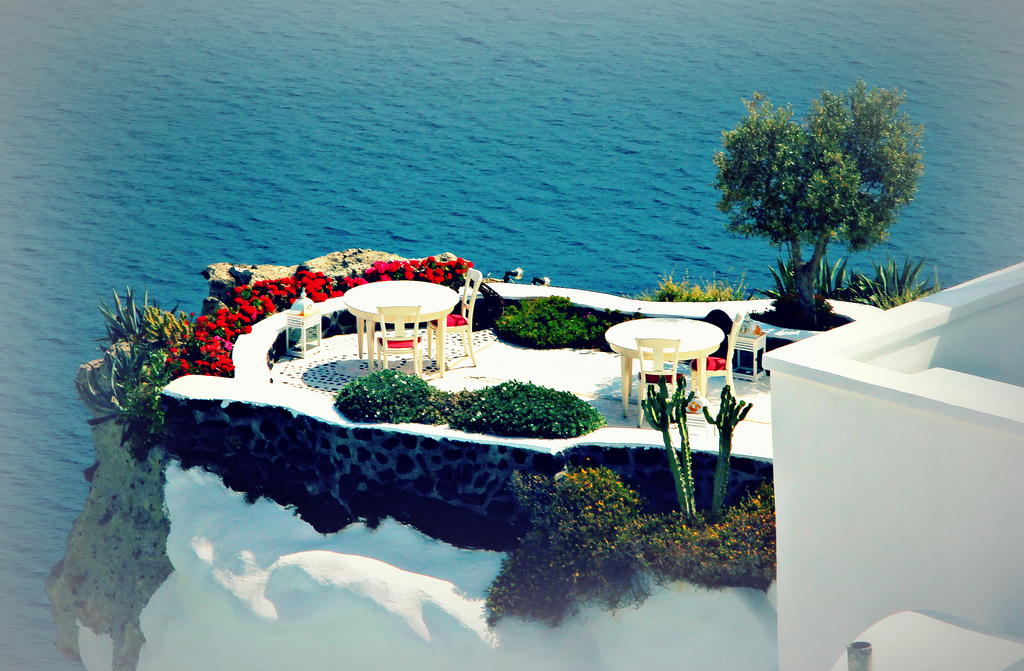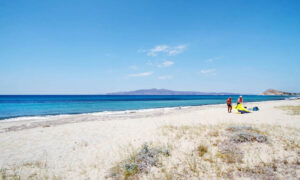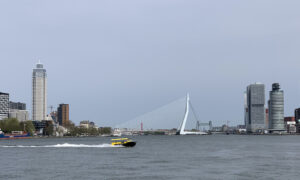With the United Kingdom basking in temperatures close to 32 degrees Centigade, spare a thought for us in Greece. Forecasts are for temperatures near 40 and getting hotter. That’s the temperature at the airport of course; in the centre of Athens it’s much hotter.
Most people are headed for the beach, one of the many on the Athenian Riviera, as there’s usually a breeze on the coast. But Greece is a big place. If you’re a traveler instead of a tourist, I have some recommendations gleaned from years spent living here about how to make your trip to Greece the best ever.
My No. 1 tip? Be patient!
In summer, the Greek population is much less laid back than at other times of the year. Mostly, Greeks are very accommodating to tourists. But in summer tempers can fray around the edges. It’s the heat!
Remember that tavernas and other eateries get very busy in summer, so be very patient with the waiters who are rushed off their feet. They work very long hours and by the end of their shifts, they really don’t want to be harassed by diners who expect fast service.
In the heat, I’m often surprised they don’t storm off and leave the more demanding tourists!
Also, as you explore Greece, go easy. Road rage is common, but Greeks are rarely physical, at least in public. Instead of lashing out with fists, they tend to be very vocal and loud. The one word that is most often yelled is ‘malaka,’ (‘μαλακα’) which has become a universal expression.
Of course there are many more “colourful” expressions, but suffice to say, you can recognise them from the tone of voice and angry expression.
Take direct flights to the most popular Greek islands
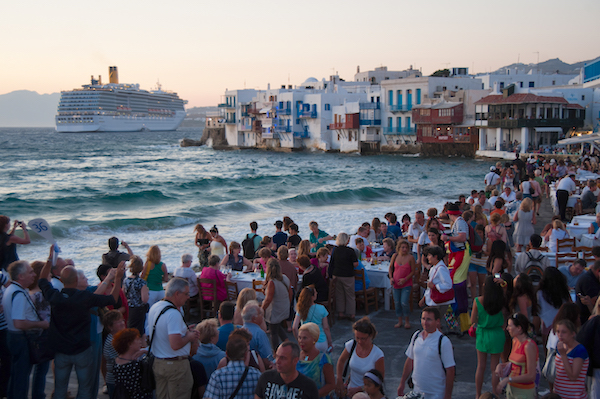
LITTLE VENICE QUAY IN MYKONOS FLOODED WITH TOURISTS
Try to avoid the islands in summer. Ferries are crowded and then there are the strikes that occur intermittently. The last thing you want is to get stranded and miss your flight from Athens airport. So try to fly to an island that has an international airport.
You can fly to the Cycladic group of islands by flying to Mykonos, Santorini, Naxos or Paros. Airlines rarely have stoppages, although air traffic controllers sometimes take industrial action. From these islands, you could catch a ferry to others in the group or even take a boat to Crete. Of course, you can also fly direct to Crete.
In the Dodecanese group of islands, you can fly to Kos, Karpathos or Rhodes. In the Ionian group you can fly to Zakinthos (Zante), Kefalonia or Corfu (Kerkyra). The Eastern Aegean islands airports include the one on Lesvos (Mytilene), and Samos.
The Sporades group of islands is located in the northwest Aegean and are served by Skiathos International Airport. The Saronic islands (Aegina. Poros, Hydra, Spetses, Agistris,and Salamina and are served by Athens International Airport.
Other islands such as Lefkada, an Ionian island, and Kos in the Dodecanese have seasonal flights. New routes from European cities are being planned.
Holidaying on the Greek mainland
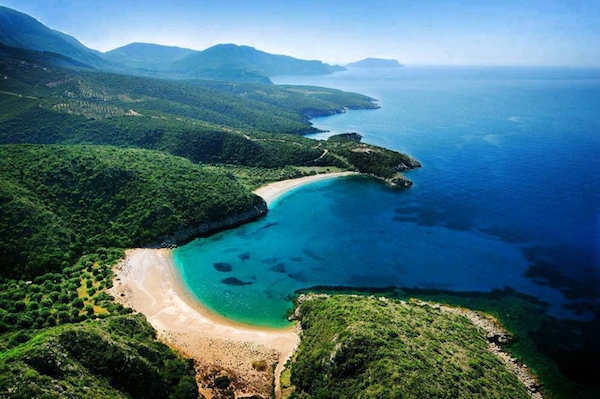
A BEACH AT HALKIDIKI
Greece has so much to offer, from archaeological sites to gourmet feasts and some excellent wines.
Instead of heading for the Greek islands and jostling with the usual hordes of tourists, why not explore the beautiful Greek mainland?
It is arguably easier to stay on mainland Greece than to venture onto the islands. There are some stunning unspoilt areas … and no foreign tourists! The Peloponnese is a wonderful region of Greece. It has an island feel to it, cut off as it is from the mainland by the man-made Corinth canal.
You can fly directly to Kalamata, famous for its delicious olives. Flight information can be found here. Explore the area’s mountains and beaches which have yet to be “discovered” by European tourists. The most majestic mountains are those of the Tayegetus range. They are totally tourist-free.
The airport at Thessaloniki, Greece’s second city, serves northern Greece, but there are several other airports on the Greek mainland. There are some wonderful beaches close to the city and Halkidiki is hugely underrated.
Here are the secret destinations tourists don’t know about
The biggest problem with tourists is they all try to cram into the same space at the same time whether you’re talking about Venice or Dubrovnik or Santorini.
Greece is blessed with a marvelous range of destinations that get very few visitors.
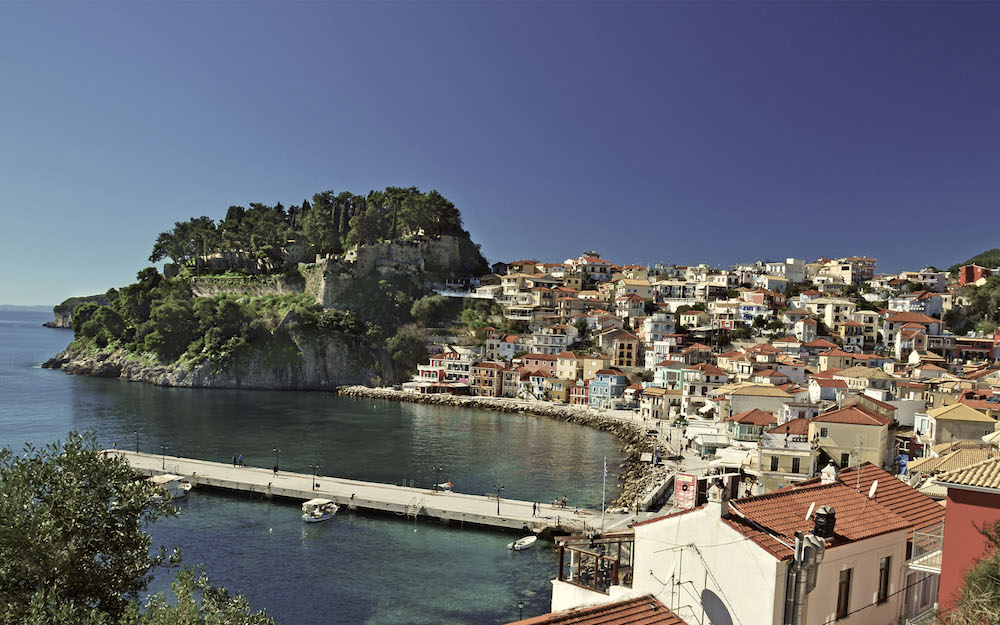
PREVÉZA
• Take Epirus, a region in northwestern Greece. The largest city in Epirus is Ioannina which borders Albania. In fact, Epirus is split between the two countries. The Greek part comprises the cities of Arta, Ioannina, Thesprotía and the beautiful Préveza. The Pindus mountains dominate the region and act as a natural border between the Greek Macedonia region and Thessaly.
The scenery is stunning and the coastal town of Préveza is reminiscent of the Greek islands. However, it is not well-known to foreign tourists. From Préveza there are a wonderful 60 kilometres of beaches extending to Parga.
Préveza has an interesting history and tourists can see its past in the Seïtan (Satan) Bazaar, which is a narrow a cobbled street, that is worth strolling down to find the ouzeris (small tavernas selling ouzo and mezes (ask for a pikolia, which is a mixture of starters). The alley got its name because during the Ottoman occupation of Greece, the locals would routinely smear the alley with fat so that the Turkish soldiers would slip and fall. A Turkish officer, so the story goes, slipped and fell and yelled “Seitan Bazaar!” and this is what it became known as.
• Immediately opposite Préveza is Actium, scene of a great naval battle in 31 BC. The battle was waged between Octavian and Mark Antony. Octavian won and to celebrate his victory he built the city of Nikopolis.
Préveza boasts many magnificent churches, such as those of Agios Nikolaos and Agios Athanasios, as well as the cathedral of Άγιος Χαράλαμπος (Saint Haralambros). Next to the church is the 18th century Venetian Clock Tower. You can also take a tour of ancient Nikopolis to see the ancient stadium and theatre as well as the Monument of Augustus.
Marcus Aurelius built a villa in the area, which gives you a clue about its beauty.
• The beautiful Lake Ioannina (Lake Pamvotida, or Pamvotis – meaning ‘the great provider’) is really spectacular. The lake is populated by birds such as grebe, snipe, herons, cormorants and swans.
While in Ioannina sample the local food, frog legs, (it’s not just the French who enjoy them!), carp and eel.
There are many other interesting places to visit in Epirus, so why not explore this region instead of heading for the overcrowded Greek islands?
• Thessaly, the land of the Centaurs (half horses and half men), is the birthplace of Achilles and Asclepius (credited with being the father of medicine), and the home of the gods, Mount Olympus. There are also some amazing beaches there – in 2018 beaches in the region were awarded 19 much-coveted blue flags. Meteora is in Thessaly, the UNESCO World Heritage Site, as is Mount Pelion, where the Centaurs lived alongside the ancient gods.
A final tip
Many people resort to using sunscreen despite the health risks. Unfortunately, many tourists manage to turn a nasty shade of lobster red when they first hit Greek beaches. If you have the misfortune to get burned, get someone to plaster you with natural yoghurt (arguably better for you than sunscreen). It soothes the skin.
If you get a red, burning face, put slices of cucumber on it. Of course, you can use cucumber all over your body. With yogurt and cucumber, all you need is garlic to conjure up tzatziki, a traditional Greek starter. (A little expat humour ….)
In my next post, I hope to write about more places to visit on mainland Greece.
About the author:
 Lynne Evans is originally from Wales but is an inveterate traveller. She is passionate about writing and feels compelled to write something every day.
Lynne Evans is originally from Wales but is an inveterate traveller. She is passionate about writing and feels compelled to write something every day.
Lynne has visited many countries in Europe and South Asia. Working as a freelance writer gives her opportunities to travel.
She’s currently living in her favourite country, Greece, in Athens. In the past she was always leaving Greece and then returning. This time she wants to stay, despite the economic situation.
More from Lynne:
Dispatches Detours: Lynne Evans is your guide for where to go, eat and stay in Peloponnese
Lynne Evans: The unvarnished truth about living in Greece


